模块5 Unit 2 The environment Grammar and usage(1)_ Verb-ing form as an adjective or adverb 课件(38张)
文档属性
| 名称 | 模块5 Unit 2 The environment Grammar and usage(1)_ Verb-ing form as an adjective or adverb 课件(38张) |
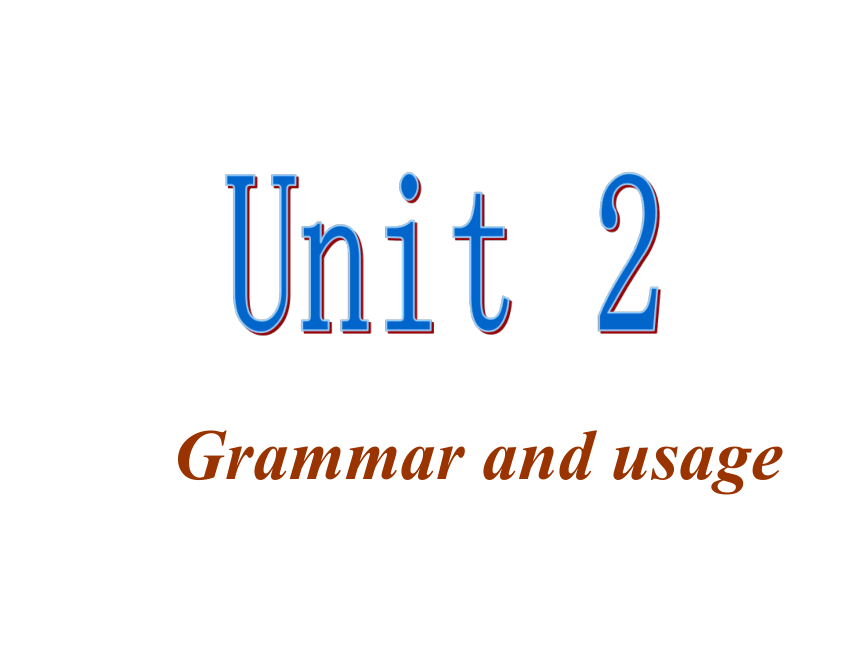
|
|
| 格式 | zip | ||
| 文件大小 | 866.5KB | ||
| 资源类型 | 教案 | ||
| 版本资源 | 牛津译林版 | ||
| 科目 | 英语 | ||
| 更新时间 | 2019-07-27 00:00:00 | ||
图片预览

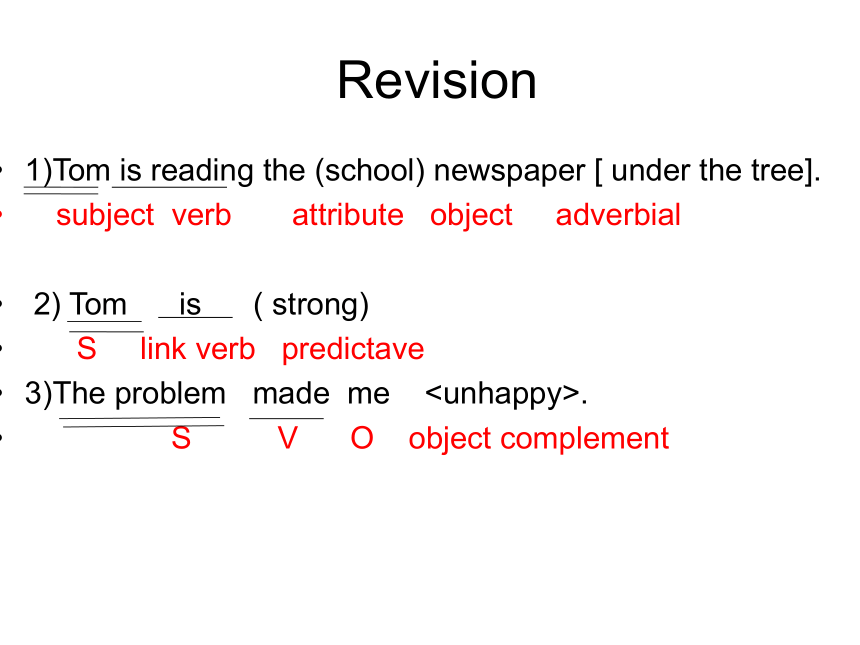
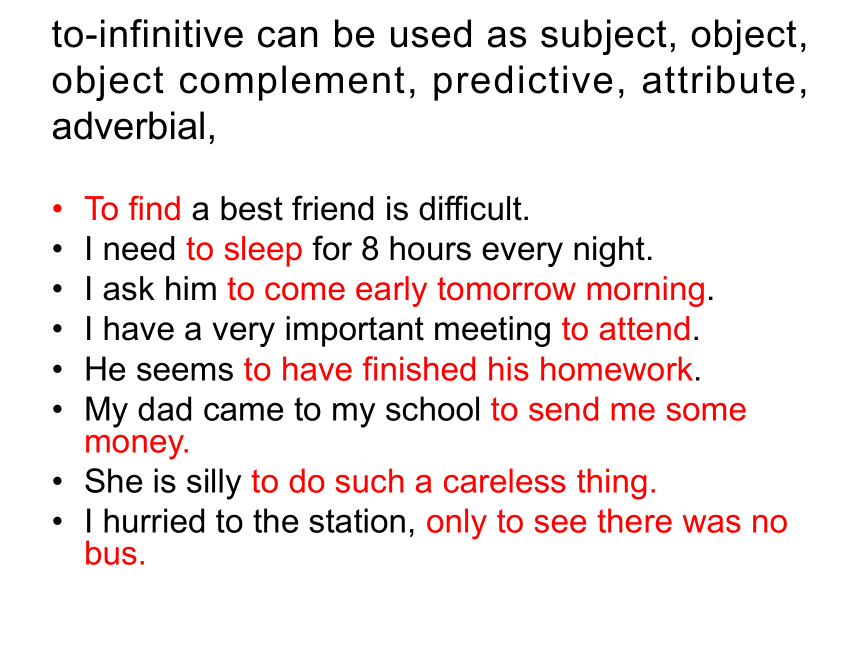
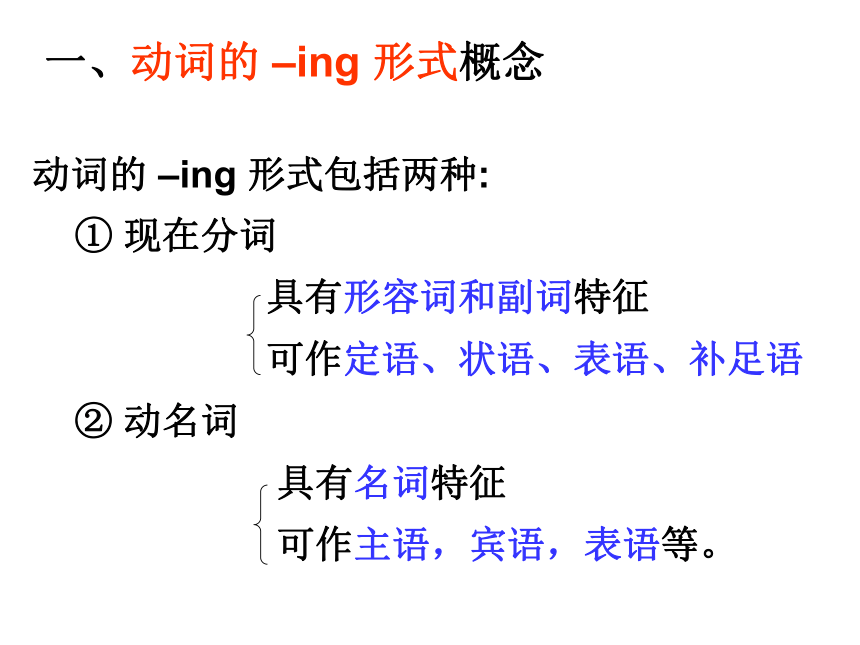
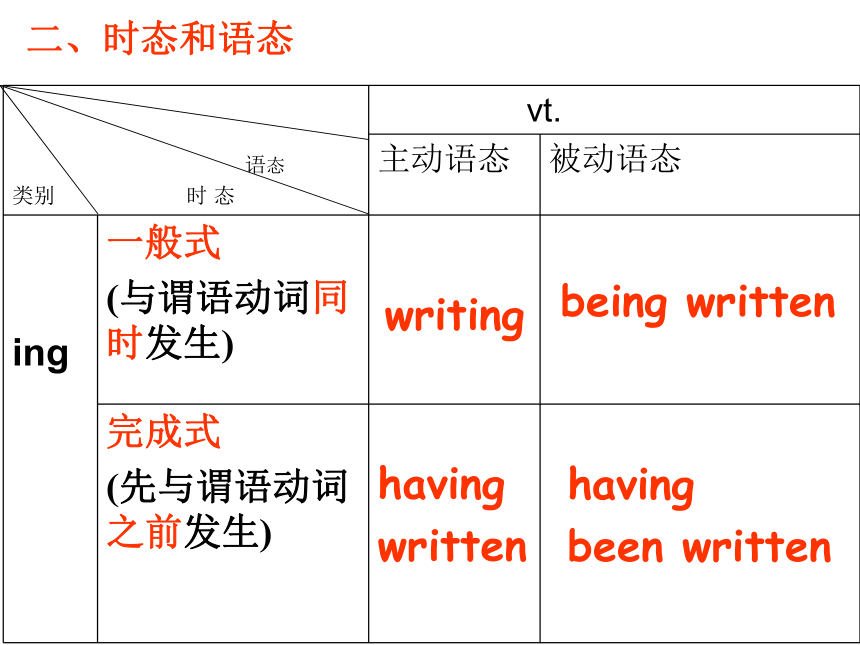

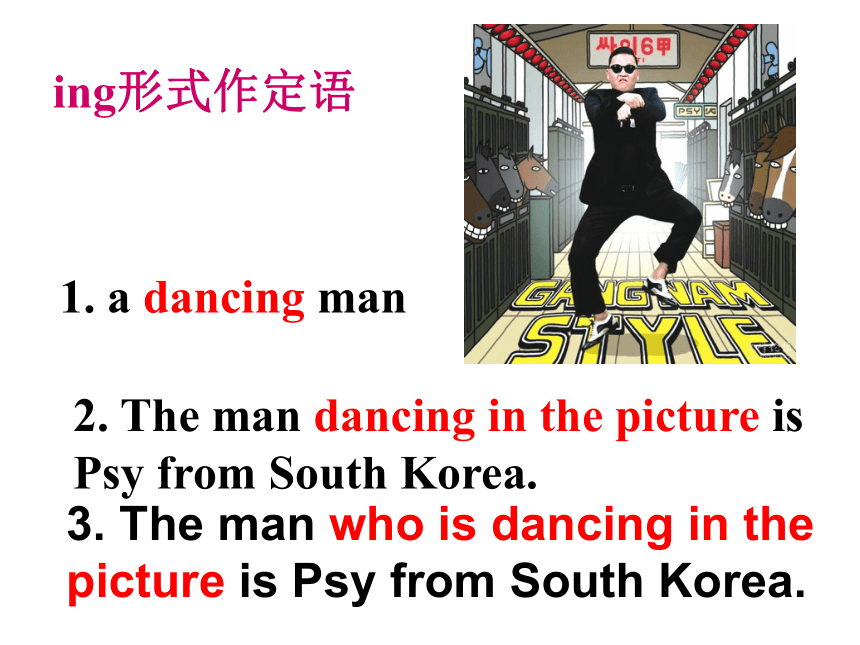
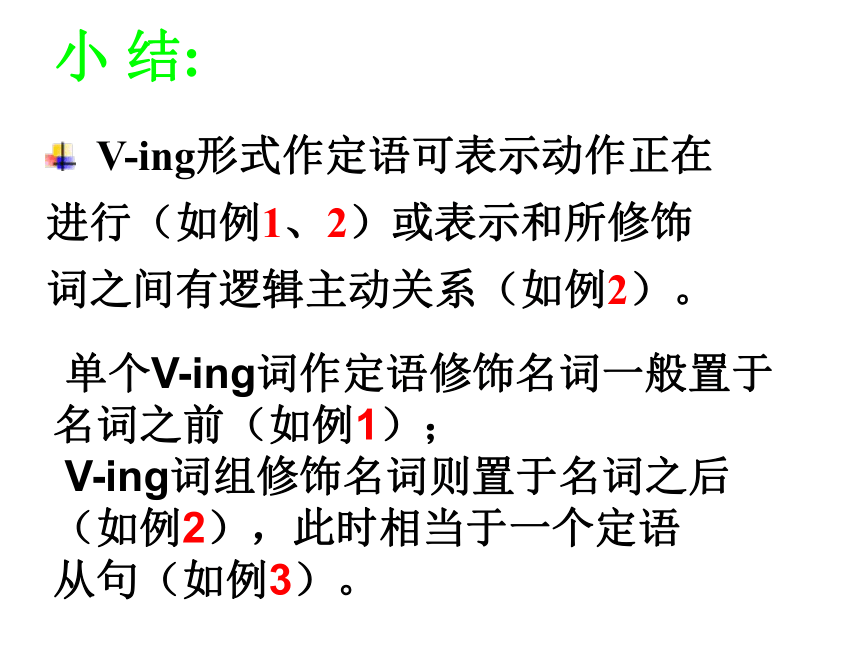

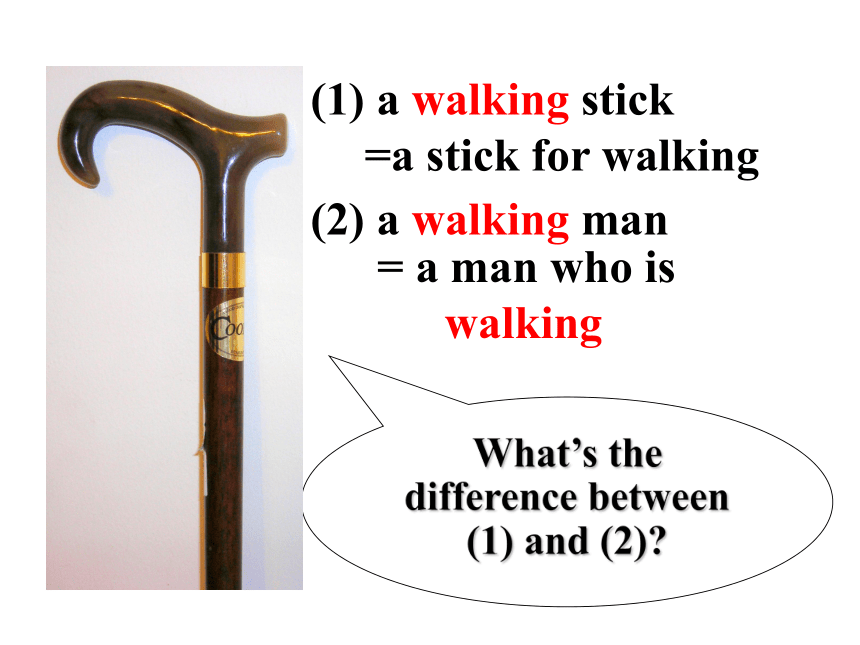
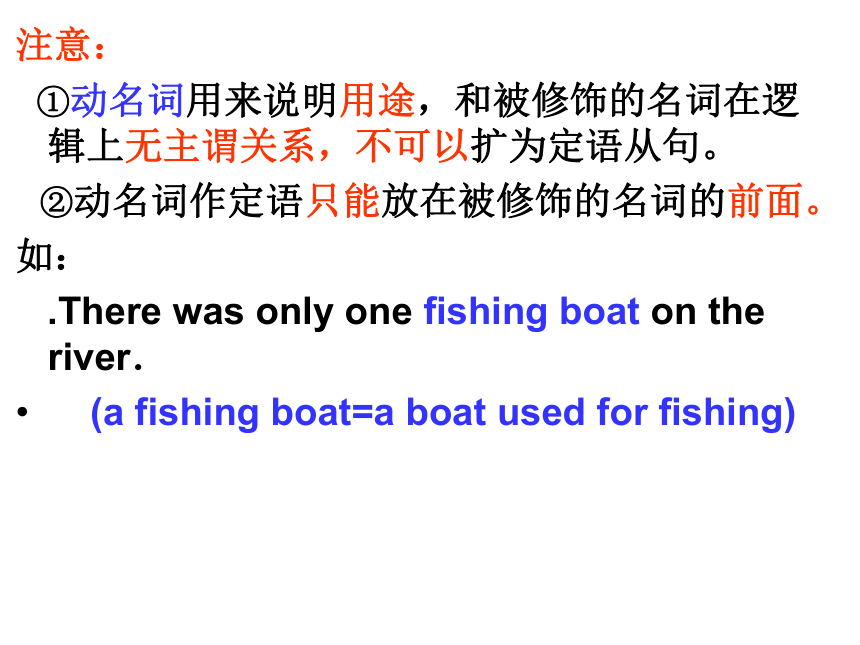
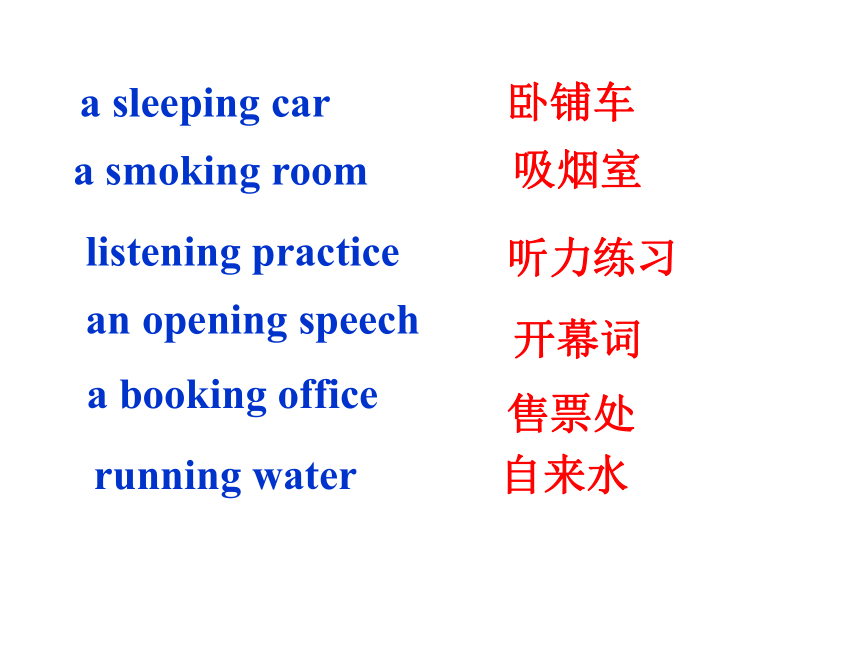
文档简介
课件38张PPT。Grammar and usageUnit 2 Revision1)Tom is reading the (school) newspaper [ under the tree].
subject verb attribute object adverbial
2) Tom is ( strong)
S link verb predictave
3)The problem made me.
S V O object complementto-infinitive can be used as subject, object, object complement, predictive, attribute, adverbial,
To find a best friend is difficult.
I need to sleep for 8 hours every night.
I ask him to come early tomorrow morning.
I have a very important meeting to attend.
He seems to have finished his homework.
My dad came to my school to send me some money.
She is silly to do such a careless thing.
I hurried to the station, only to see there was no bus. 一、动词的 –ing 形式概念
动词的 –ing 形式包括两种:
① 现在分词
具有形容词和副词特征
可作定语、状语、表语、补足语
② 动名词
具有名词特征
可作主语,宾语,表语等。二、时态和语态writingbeing writtenhaving
writtenhaving
been written现在分词的语法功能一、ing形式作定语2. The man dancing in the picture is Psy from South Korea.1. a dancing maning形式作定语3. The man who is dancing in the picture is Psy from South Korea.小 结: V-ing形式作定语可表示动作正在进行(如例1、2)或表示和所修饰词之间有逻辑主动关系(如例2)。 单个V-ing词作定语修饰名词一般置于
名词之前(如例1);
V-ing词组修饰名词则置于名词之后
(如例2),此时相当于一个定语
从句(如例3)。The people sitting behind us are teachersThe expert coming from Hongkong is a lady called Ms Cai.=The people who are sitting behind us are soccer players.=The expert who comes from Hongkong is a lady called Ms Cai.Rewrite the following sentences with attributive clauses.(2) a walking man(1) a walking stick =a stick for walking = a man who is walkingWhat’s the difference between (1) and (2)?注意:
①动名词用来说明用途,和被修饰的名词在逻 辑上无主谓关系,不可以扩为定语从句。
②动名词作定语只能放在被修饰的名词的前面。
如:
.There was only one fishing boat on the river.
(a fishing boat=a boat used for fishing)
a sleeping cara smoking room listening practice an opening speecha booking officerunning water卧铺车吸烟室听力练习开幕词售票处自来水二、ing形式作表语
Your journey in Kenya is really exciting.
What you did was disappointing.
The nightmare I had last night was very frightening.
现在分词作表语通常表示主语的属性和特征,相当于形容词,其主语通常是物.
2: Predicative三、ing形式作宾语补足语 I heard the girl singing in the classroom. I noticed a long queue outside the bank waiting for it to open.3.Object Complement: The baby watched his dad shaving his face with great interest.常见的两类接现在分词作宾补的动词:
⑴感官动词: see,hear,watch,find,feel,smell,observe notice,look at,listen to等。
⑵使役动词:have,keep,get,catch,leave,set等。 能跟-ing形式作宾语补足语的常见动词有:“五让、三看、两听、一发现、注意观察感觉” make, let, have, keep, leave, look at, see, watch, hear, listen to, find, notice, observe, feel等。两个区别:
1).现在分词作宾补与不定式做宾补的区别。
现在分词:动作正在进行。
不定式: 动作的全过程。
试比较:
1. I heard her singing a song just now.
(正在进行的动作)
2. I heard her sing a song just now.
(听见全过程)
Example:
I saw Tom _____ the street and _____ enter a shop.
A. crossing, entering
B. cross, enter
C. crossing, enter
D. crossing, entering2). 现在分词被动式与过去分词作宾补的区别。
现在分词: 被动, 动作正在进行。
过去分词: 被动, 动作已经完成。
试比较:
1. I saw him being taken away.
我看到他正被人带走。(正在进行)
2. I saw him taken away.
我看到他被带走了。(完成)1. Sixty million people _____ (live) in rural areas are moving to the cities every year.
2. The bottle _________ (contain) the poison was sent to the laboratory.
3. Our trip was ______________(disappoint). We did not find any unusual plants.
PracticelivingcontainingFill in the blanks with the verb given in its proper form.disappointing4. I saw them ______(force) the door open with a hammer.
5. We heard them _________ (quarrel) about money after the concert; they looked very angry.
6. The news was __________(shock). All the three boats had sunk in the storm.forcingquarrelingshocking四、ing形式作状语4.现在分词作状语
1). 作时间状语,相当于时间状语从句 (常同连词when,
whenever, while, once, until等连用)
Hearing the bad news, they couldn’t help crying.
=When they heard the bad news, they couldn’t help crying.
Having received his letter, I decided to write back. =After I had received his letter, I decided
to write back.2).作原因状语,相当于原因状语从句。
Being a student, I must work hard.Being so angry, he couldn’t go to sleep.=Because he was so angry, he couldn’t go to sleep.=Because I am a student, I must work hard.=Because he didn’t know what to do next, he
turned to the teacher for help.Not knowing what to do next, he turned to
the teacher for help.3. 作条件状语,相当于条件状语从句
Working hard, you will succeed. Putting more salt into the soup, you will
find it more delicious.=If you put more salt into the soup, you
will find it more delicious.=If you work hard, you will ucceed. 4. 作伴随状语,相当于并列句
They came into the classroom, singing and laughing. =They sang and laughed; they came into the classroom. 5. 作结果状语
His father died, leaving him lots of money.
注意: V-ing有其完成式having done, 表示分
词动作发生于主句动作之前。
V-ing形式的否定not要置于V-ing之前。
分词作状语时,其逻辑主语同主句的主
语一致且有逻辑主动关系,往往可转换
为相应的状语从句。
1. a. Hearing the news, tears ran down her face.
b. Hearing the news, she cried out sadly.
2. a. Entering the classroom, I found nobody in it.
b. Entering the classroom, nobody was found in it.Choose the correct sentence.3. a. Looking out through the window, the garden was beautiful.
b. Looking out through the window, we saw a beautiful garden.
4. a. Reading the evening newspaper, a dog started barking.
b. I was reading the evening newspaper when a dog started barking.Their car was caught in a traffic jam, thus ____ the delay.
A. to cause B. causing
C. caused D. cause
2. I was in the bathroom, not ___ the knock at the door.
A. hear B. to hear C. hearing D. heardMultiple choice3. After seeing the movie, _____.
A. the book was read by him
B. the book made him want to read it
C. he wanted to read the book
D. the reading of the book interested
him4. The next morning she found the man in bed, _____ dead.
A. lying B. lie C. lay D. laying
5. There was terrible noise ____ the sudden burst of light.
A. followed B. following
C. to be followed D. being followed6. The secretary worked late into the night, ____ a long speech for the president.
A. to prepare B. preparing
C. prepared D. was preparing7. “Can’t you read?” Mary said____ to the notice.
A. angrily pointing B. and point angrily C. angrily pointed D. and angrily pointing8. ___ a reply, he decided to write again.
A. Not receiving B. Receiving not C. Not having received D. Having not received
9. They apologized for ____ to attend the meeting. A. their not being able B. their being not able C. them not able D. them being able notHomework1. Review Verb-ing form as an adjective or adverb
2. Do exercise C2 on page 100.
subject verb attribute object adverbial
2) Tom is ( strong)
S link verb predictave
3)The problem made me
S V O object complementto-infinitive can be used as subject, object, object complement, predictive, attribute, adverbial,
To find a best friend is difficult.
I need to sleep for 8 hours every night.
I ask him to come early tomorrow morning.
I have a very important meeting to attend.
He seems to have finished his homework.
My dad came to my school to send me some money.
She is silly to do such a careless thing.
I hurried to the station, only to see there was no bus. 一、动词的 –ing 形式概念
动词的 –ing 形式包括两种:
① 现在分词
具有形容词和副词特征
可作定语、状语、表语、补足语
② 动名词
具有名词特征
可作主语,宾语,表语等。二、时态和语态writingbeing writtenhaving
writtenhaving
been written现在分词的语法功能一、ing形式作定语2. The man dancing in the picture is Psy from South Korea.1. a dancing maning形式作定语3. The man who is dancing in the picture is Psy from South Korea.小 结: V-ing形式作定语可表示动作正在进行(如例1、2)或表示和所修饰词之间有逻辑主动关系(如例2)。 单个V-ing词作定语修饰名词一般置于
名词之前(如例1);
V-ing词组修饰名词则置于名词之后
(如例2),此时相当于一个定语
从句(如例3)。The people sitting behind us are teachersThe expert coming from Hongkong is a lady called Ms Cai.=The people who are sitting behind us are soccer players.=The expert who comes from Hongkong is a lady called Ms Cai.Rewrite the following sentences with attributive clauses.(2) a walking man(1) a walking stick =a stick for walking = a man who is walkingWhat’s the difference between (1) and (2)?注意:
①动名词用来说明用途,和被修饰的名词在逻 辑上无主谓关系,不可以扩为定语从句。
②动名词作定语只能放在被修饰的名词的前面。
如:
.There was only one fishing boat on the river.
(a fishing boat=a boat used for fishing)
a sleeping cara smoking room listening practice an opening speecha booking officerunning water卧铺车吸烟室听力练习开幕词售票处自来水二、ing形式作表语
Your journey in Kenya is really exciting.
What you did was disappointing.
The nightmare I had last night was very frightening.
现在分词作表语通常表示主语的属性和特征,相当于形容词,其主语通常是物.
2: Predicative三、ing形式作宾语补足语 I heard the girl singing in the classroom. I noticed a long queue outside the bank waiting for it to open.3.Object Complement: The baby watched his dad shaving his face with great interest.常见的两类接现在分词作宾补的动词:
⑴感官动词: see,hear,watch,find,feel,smell,observe notice,look at,listen to等。
⑵使役动词:have,keep,get,catch,leave,set等。 能跟-ing形式作宾语补足语的常见动词有:“五让、三看、两听、一发现、注意观察感觉” make, let, have, keep, leave, look at, see, watch, hear, listen to, find, notice, observe, feel等。两个区别:
1).现在分词作宾补与不定式做宾补的区别。
现在分词:动作正在进行。
不定式: 动作的全过程。
试比较:
1. I heard her singing a song just now.
(正在进行的动作)
2. I heard her sing a song just now.
(听见全过程)
Example:
I saw Tom _____ the street and _____ enter a shop.
A. crossing, entering
B. cross, enter
C. crossing, enter
D. crossing, entering2). 现在分词被动式与过去分词作宾补的区别。
现在分词: 被动, 动作正在进行。
过去分词: 被动, 动作已经完成。
试比较:
1. I saw him being taken away.
我看到他正被人带走。(正在进行)
2. I saw him taken away.
我看到他被带走了。(完成)1. Sixty million people _____ (live) in rural areas are moving to the cities every year.
2. The bottle _________ (contain) the poison was sent to the laboratory.
3. Our trip was ______________(disappoint). We did not find any unusual plants.
PracticelivingcontainingFill in the blanks with the verb given in its proper form.disappointing4. I saw them ______(force) the door open with a hammer.
5. We heard them _________ (quarrel) about money after the concert; they looked very angry.
6. The news was __________(shock). All the three boats had sunk in the storm.forcingquarrelingshocking四、ing形式作状语4.现在分词作状语
1). 作时间状语,相当于时间状语从句 (常同连词when,
whenever, while, once, until等连用)
Hearing the bad news, they couldn’t help crying.
=When they heard the bad news, they couldn’t help crying.
Having received his letter, I decided to write back. =After I had received his letter, I decided
to write back.2).作原因状语,相当于原因状语从句。
Being a student, I must work hard.Being so angry, he couldn’t go to sleep.=Because he was so angry, he couldn’t go to sleep.=Because I am a student, I must work hard.=Because he didn’t know what to do next, he
turned to the teacher for help.Not knowing what to do next, he turned to
the teacher for help.3. 作条件状语,相当于条件状语从句
Working hard, you will succeed. Putting more salt into the soup, you will
find it more delicious.=If you put more salt into the soup, you
will find it more delicious.=If you work hard, you will ucceed. 4. 作伴随状语,相当于并列句
They came into the classroom, singing and laughing. =They sang and laughed; they came into the classroom. 5. 作结果状语
His father died, leaving him lots of money.
注意: V-ing有其完成式having done, 表示分
词动作发生于主句动作之前。
V-ing形式的否定not要置于V-ing之前。
分词作状语时,其逻辑主语同主句的主
语一致且有逻辑主动关系,往往可转换
为相应的状语从句。
1. a. Hearing the news, tears ran down her face.
b. Hearing the news, she cried out sadly.
2. a. Entering the classroom, I found nobody in it.
b. Entering the classroom, nobody was found in it.Choose the correct sentence.3. a. Looking out through the window, the garden was beautiful.
b. Looking out through the window, we saw a beautiful garden.
4. a. Reading the evening newspaper, a dog started barking.
b. I was reading the evening newspaper when a dog started barking.Their car was caught in a traffic jam, thus ____ the delay.
A. to cause B. causing
C. caused D. cause
2. I was in the bathroom, not ___ the knock at the door.
A. hear B. to hear C. hearing D. heardMultiple choice3. After seeing the movie, _____.
A. the book was read by him
B. the book made him want to read it
C. he wanted to read the book
D. the reading of the book interested
him4. The next morning she found the man in bed, _____ dead.
A. lying B. lie C. lay D. laying
5. There was terrible noise ____ the sudden burst of light.
A. followed B. following
C. to be followed D. being followed6. The secretary worked late into the night, ____ a long speech for the president.
A. to prepare B. preparing
C. prepared D. was preparing7. “Can’t you read?” Mary said____ to the notice.
A. angrily pointing B. and point angrily C. angrily pointed D. and angrily pointing8. ___ a reply, he decided to write again.
A. Not receiving B. Receiving not C. Not having received D. Having not received
9. They apologized for ____ to attend the meeting. A. their not being able B. their being not able C. them not able D. them being able notHomework1. Review Verb-ing form as an adjective or adverb
2. Do exercise C2 on page 100.
